When this brave Lab girl was found outside a shelter in California, she was near the point of giving up. Amber was extremely emaciated, weak, and almost unable to lift her head.
And, then – a complete heartbreak!
She didn’t have any belongings except for one little Teddy bear that she held close to herself. Seeing her tied up there, sticking closely to her fluffy buddy, broke her rescuers’ hearts. But, even that wasn’t the whole story…
A Girl With With The Sweetest Secret
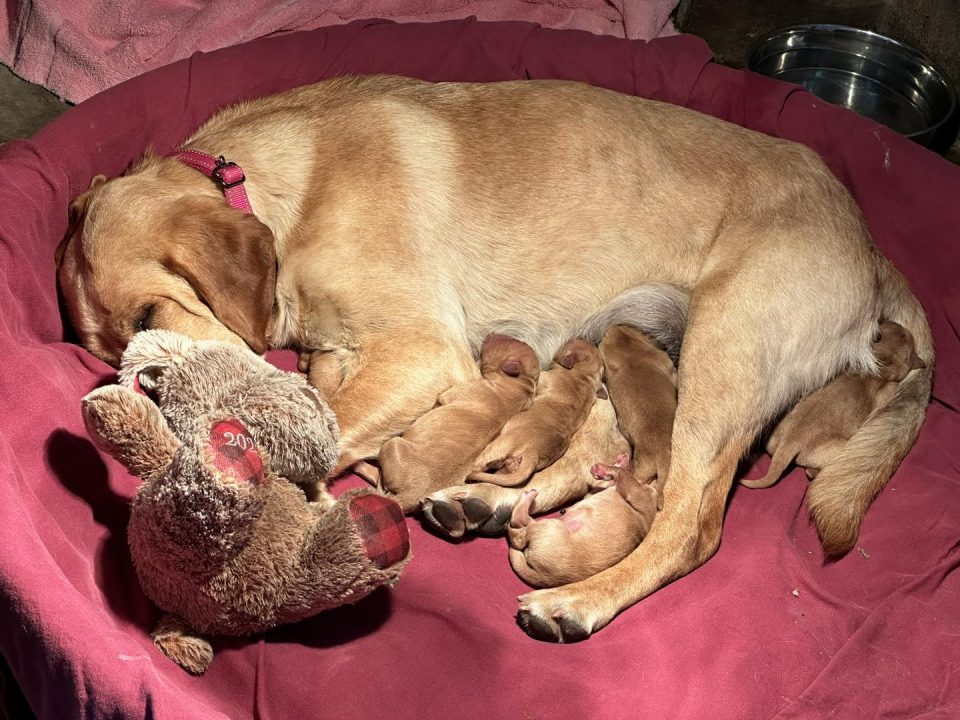
On top of her condition, Amber carried a litter!
That very night, when she was found and taken to a California shelter in the Bay Area, she delivered six tiny yellow babies.
“Yellow lab Mama Amber was left tied to shelter fence in the middle of the night, very pregnant, and she delivered the next day at the shelter,” the DARP team wrote on Facebook.
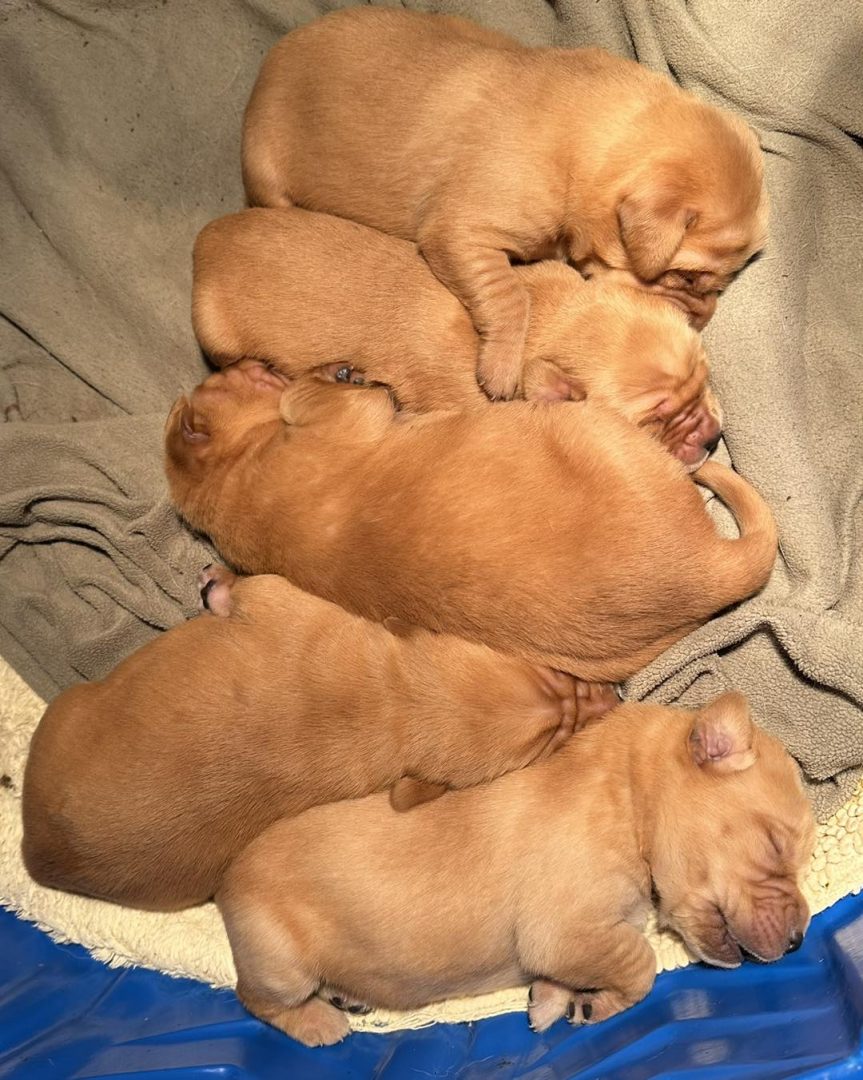
Luckily, the good shelter volunteers kept her company and took care of her throughout the entire process, which made Amber feel at least a little bit safer.
The next morning, the Dogwood Animal Rescue Project crew from Sonoma County, California, decided to take in Amber and her babies after hearing their story.
On her very first day at the rescue, Amber was (understandably) quite exhausted and stressed out.
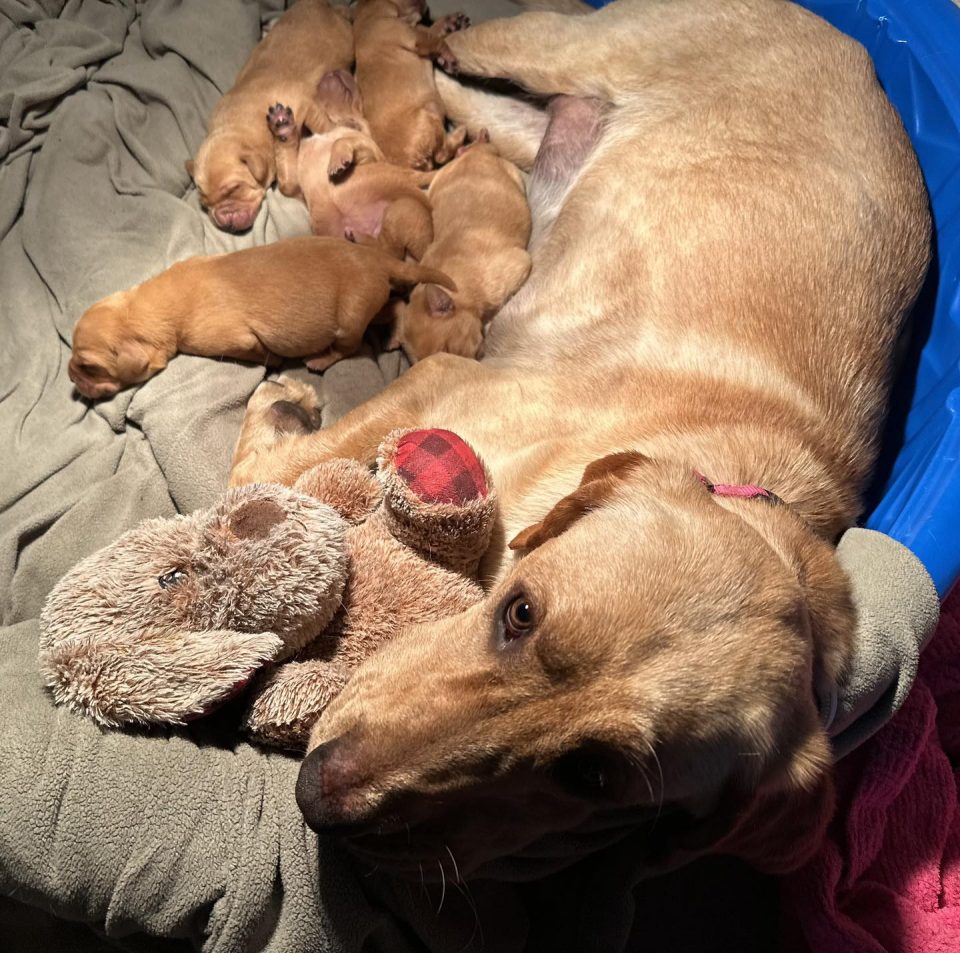
“Her first 24 hours with us she mostly slept in her warm quiet bed, no doubt exhausted from being left at the shelter with her stuffy (which makes a good pillow) and from almost immediately going labor and delivering and caring for newborns,” her caregivers stated on Facebook.
She needed some time to rest, but even her condition didn’t stop her from being a wonderful momma.
Finally Warm And Safe Inside
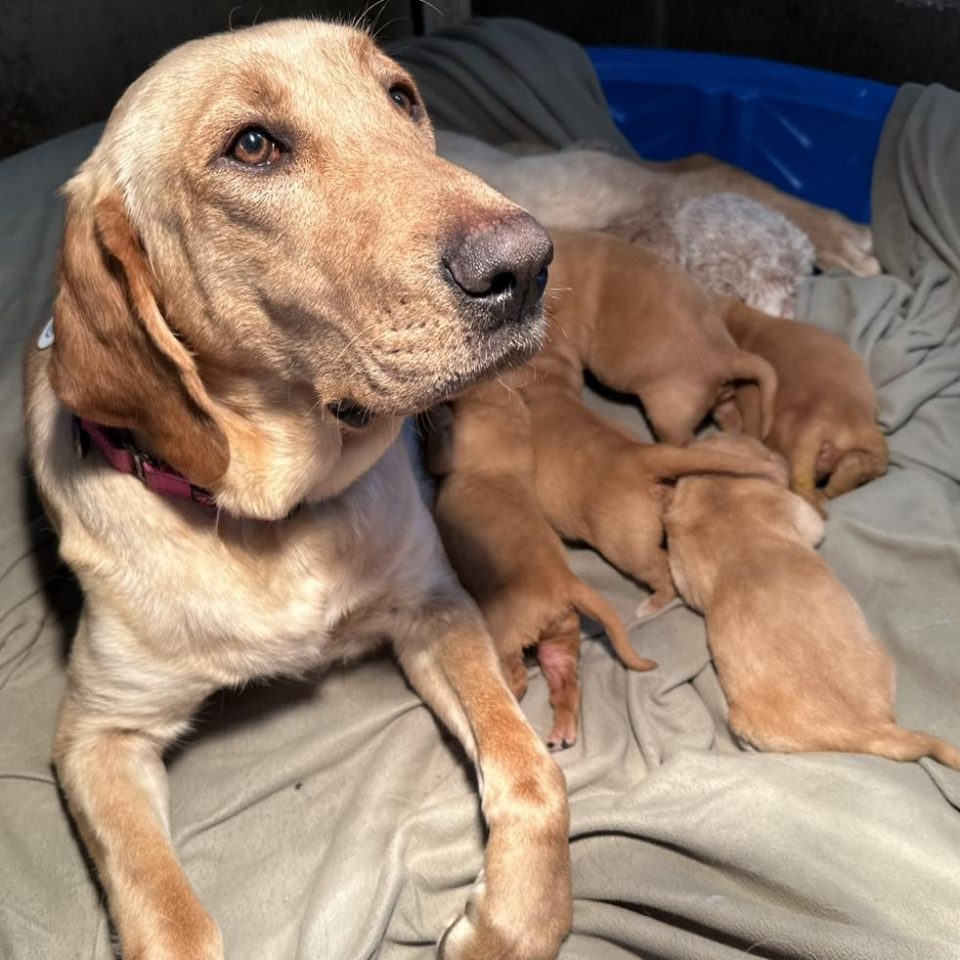
She was an attentive caregiver all along, making sure her puppies were safe and well-fed. Sadly, shortly after they moved to the new facility, one of her babies crossed the rainbow bridge.
Even though this was quite expected, given Amber’s levels of stress and the fact that she was emaciated, the heartbreak was still massive.
Both Amber and her hoomans felt a huge void after losing their furry member of the family. Yet, they needed to keep moving forward – for Amber and her other babies.
After only a couple of weeks, this brave girl finally came out of her shell, and her charming, soft character surfaced!
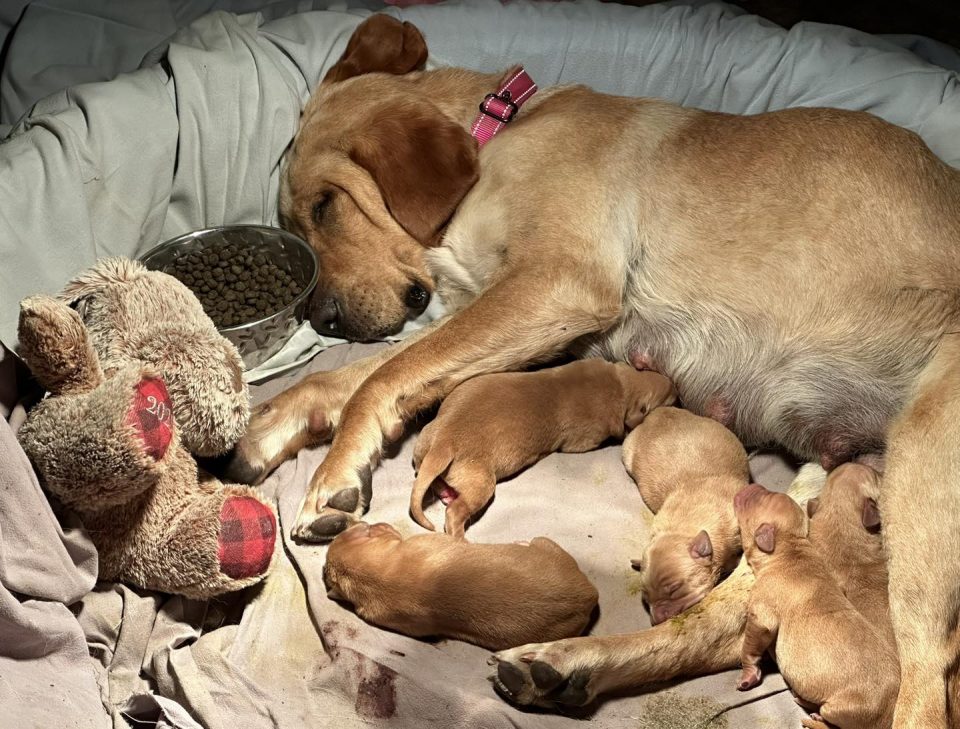
Everybody was dazzled with Amber’s quite affectionate nature and the fact that she was just the sweetest girl ever. Despite her new mother role, she was still acting like a puppy, craving love and sharing it back in return with everyone.
But, most importantly, her caregivers were extremely happy that Amber and her litter finally got a second chance!
“It’s cold, rainy and blowing outside but Ambers little family is warm and safe inside. We’re so thankful to be able to provide a safe, loving place for them,” the rescue said in a Facebook post.
After a traumatic past which was probably the hardest part of her life, she and her five babies are finally on the right path.
From now on, they will be waiting for the day when hoomans will walk through that door with one and only one plan – to make them permanent members of their family!
If you’ve ever caught your furry friend munching on dirt like it’s a gourmet meal, you’re not alone. Dogs have some quirky habits, and eating dirt is definitely up there on the list. As a seasoned dog trainer, I’ve seen this behavior more times than I can count, and there are a few reasons why your pup might be digging into the earth. It’s not just about a lack of table manners; there could be some interesting explanations behind this curious habit.
When your canine companion starts chowing down on dirt, it might leave you scratching your head in confusion. But fret not, there’s more to this behavior than meets the eye. From nutritional deficiencies to boredom busters, your dog’s dirt-eating escapades could reveal a lot about their well-being and instincts. Let’s dig a little deeper into the world of dogs and their dirt-eating tendencies.
Understanding the Root Causes
Nutritional Deficiencies Explained
If your dog is eating dirt, it could signal potential nutritional gaps in its diet. Dogs may seek out minerals found in soil when they lack essential nutrients. Ensure your furry friend is getting a balanced diet to prevent this behavior.
Behavioral Factors and Dog Psychology
Dogs may eat dirt due to behavioral reasons such as boredom or anxiety. Providing enough physical and mental stimulation for your pet can help curb this habit. Understanding your dog’s psychology can also shed light on why they feel compelled to eat dirt.
The Role of Digestive Issues
Digestive issues can also lead dogs to eat dirt. If your dog is experiencing gastrointestinal problems, they may try to self-medicate by consuming dirt. Consulting a veterinarian to address any underlying health issues can help address this behavior effectively.
Potential Health Impacts of Dirt Consumption
If your dog is munching on dirt, it could lead to potential health issues. Here are some impacts to watch out for:
Parasites and Contaminants
Eating dirt exposes your dog to parasites like roundworms or contaminants like pesticides. These can cause stomach upset and other health problems. Ensure your dog’s environment is clean to reduce the risk of contamination.
Dental and Digestive Complications
Chewing on dirt can wear down your dog’s teeth and lead to dental issues. Swallowing dirt may also result in gastrointestinal disturbances like vomiting or diarrhea. Monitor your dog closely to prevent such complications.
Remember, keeping a close eye on your dog’s dirt-eating habits and consulting with a vet if necessary is crucial for maintaining their health and well-being.
Assessing Your Dog’s Behavior
Identifying Triggers for Dirt Eating
To identify triggers for your dog’s dirt-eating behavior, observe any patterns related to when and where it occurs. Notice if it happens during specific activities or in certain environments. Keep an eye on your dog’s overall well-being and behavior to pinpoint any changes that may coincide with the dirt consumption.
When to Consult a Veterinarian
If you notice persistent dirt eating despite attempts to discourage it, or observe any negative health effects in your dog, it’s time to consult a veterinarian. Seek professional advice if the behavior leads to digestive issues, unusual lethargy, or any other concerning symptoms. A vet can help rule out underlying health conditions and provide guidance on managing this behavior effectively.
Addressing the Issue
Dietary Adjustments and Supplements
When dealing with your dog eating dirt, consider adjusting its diet and providing necessary supplements. Ensure your dog is getting a well-balanced and nutritious diet to prevent nutritional deficiencies that might be causing this behavior. Consulting with a vet can help determine if any specific supplements are needed to address any potential deficiencies.
Behavioral Training Strategies
To tackle your dog’s dirt-eating behavior, it’s essential to implement effective behavioral training strategies. Positive reinforcement techniques, such as rewarding good behavior and redirecting attention away from dirt, can help discourage this habit. Consistency in training and patience are key to modifying your dog’s behavior successfully.
Providing Adequate Stimulation and Exercise
Ensure your dog receives enough mental and physical stimulation to prevent boredom, which can lead to unusual behaviors like eating dirt. Engage your dog in interactive play, regular exercise, and mentally stimulating activities to keep it mentally sharp and physically active. Adequate stimulation and exercise can help curb undesirable behaviors and promote overall well-being.
Prevention Tips for Dog Owners
Safe Outdoor Play Areas
When it comes to preventing your dog from eating dirt, creating safe outdoor play areas is essential. Designate specific areas in your yard where your dog can play freely without access to dirt or soil. Ensure these areas are clear of any debris or substances that might tempt your dog to indulge in dirt consumption. By controlling your dog’s environment, you can minimize the chances of them ingesting dirt while they enjoy their outdoor time.
Regular Health Check-Ups and Diet Monitoring
Another crucial aspect of preventing your dog from eating dirt is to schedule regular health check-ups and monitor their diet closely. Regular vet visits can help identify any underlying health issues that might be causing your dog to eat dirt, such as nutritional deficiencies or gastrointestinal problems. Monitoring your dog’s diet ensures they are receiving the necessary nutrients, reducing the likelihood of cravings for non-nutritive substances like dirt. By staying proactive in your dog’s health and nutrition, you can address potential triggers for dirt consumption early on and prevent this behavior effectively.
Conclusion
Understanding why your dog eats dirt is essential for their well-being. From nutritional deficiencies to behavioral triggers, various factors can contribute to this behavior. Remember, dirt consumption might indicate underlying health issues, so consulting a vet is crucial. By creating dirt-free play areas and monitoring your dog’s diet closely, you can help prevent this habit. Stay consistent, patient, and seek guidance from your vet to ensure your furry friend stays healthy and happy.
Frequently Asked Questions
Why do dogs eat dirt?
Dogs may eat dirt due to nutritional deficiencies, behavioral issues, or underlying health problems. It could be a way to self-medicate for gastrointestinal discomfort.
How can I prevent my dog from eating dirt?
Prevent dirt consumption by ensuring your dog has a balanced diet, regular vet check-ups, and creating safe outdoor play areas free of dirt.
When should I consult a vet about my dog’s dirt-eating behavior?
Consult a vet if your dog continues to eat dirt regularly, as it could be a sign of a more serious underlying health issue that needs to be addressed timely.
[no_toc]

Hey there, I’m Janet Brooks, a dog-loving student from California. I’m all about helping pups in need, especially those without homes. Me and my awesome friends work together to give shelter and love to stray dogs. Oh, and I also write blogs about dogs to share helpful info.